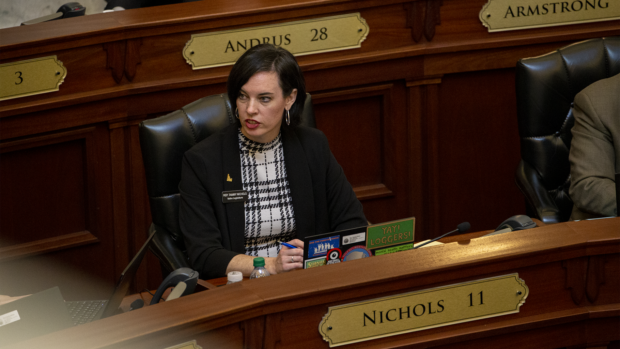A Republican primary contest in Middleton includes two candidates with one thing in common: Both have children who attended Idaho public schools. But incumbent Sen. Tammy Nichols and political newcomer Lori Bishop take divergent approaches to education policy.
Nichols is seeking a second term in the Senate — and fourth overall in the Statehouse. A leader of the Legislature’s hardline conservative caucus, Nichols calls herself a “peopletician,” as opposed to a politician. “I’m the lobbyist for the people that can’t afford a lobbyist.” As a member of the Senate Education Committee, Nichols has lobbied for directing public money to private education and expanding options for families dissatisfied with public schools.
Bishop, a parent teacher association mom, says she entered the race because Nichols’ priorities have threatened public schools. She criticized Nichols’ frequent opposition to state spending and her sponsorship of a school choice bill that could have busted Idaho’s public school budget.
“I think that we should concentrate on making the public education system that we already have better rather than pivoting to a new one,” she said.
Nichols touts support for school choice, opposition to federal spending
In the Senate, Nichols supported public funding mechanisms for private schooling that fall under the loose heading of school choice. In 2023, she sponsored a bill — along with Sen. Brian Lenney, R-Nampa — to create a universal education savings account (ESA) program that would have allowed private school families to claim about $6,000 annually from the state.
The bill ultimately failed to overcome concerns, among Republicans and Democrats, about future costs and the adequacy of measures to account for the money. But Nichols says school choice remains a priority.
School choice benefits families who couldn’t otherwise afford private school, Nichols argues. She said that she’s met universal ESA recipients in other states who “grew up in the hood, in inner cities,” and “they really give credit to being able to change the road that their life was taking.”
Universal ESA programs, like the one Nichols and Lenney proposed, don’t restrict eligibility based on income or special needs. In other states with universal programs, such as Arizona and Florida, recipients tend to be wealthy, with children who have previously attended private school.
Nichols blames Idaho teachers’ unions for building opposition to school choice proposals like hers, and pointed to polling that shows public support for an ESA-style program. The Idaho Education Association has stood against vouchers, ESAs and tuition tax credits, as have other public education groups, including the one that represents locally elected school trustees.
“It boils down to having people in the Legislature who, one, are supportive of that and, two, stand up to the unions,” Nichols said.

Nichols, who runs a property management business, won election to the Senate in 2022 after two House terms. She lists among her legislative accomplishments a bill this session that created a new state license plate representing the Gadsden Flag. The coiled snake and “Don’t Tread on Me” emblem have been associated with right-wing populism in recent years.
Proceeds from sales of the license plates will fund a new firearm safety grant fund and program for K-12 students. “I think it’s really good to start kids young, to teach them about firearms at a young age,” Nichols said.
Nichols also sponsored a bill that prevented animals, inanimate objects and artificial intelligence from being granted “personhood status.” And she proposed an unsuccessful bill that would have made it a misdemeanor to administer mNRA vaccines, including the COVID-19 vaccine.
Nichols co-chairs the Idaho Freedom Caucus, a hardline conservative group with a dozen lawmakers. Nichols said the caucus has four policy goals: protecting constitutional rights; fiscal responsibility, transparency and accountability; restoring quality education; and supporting and protecting families and children.
“We work together to help facilitate those goals, and a lot of our legislation that we run or support does that, and the things that we work against are things that we feel take away from those goals,” she said.
The caucus, including Nichols, has frequently opposed state agency budgets — particularly during the COVID-19 pandemic, when the state accepted federal aid for learning loss programs at schools, transportation and water infrastructure and other relief initiatives. Nichols said she opposed using American Rescue Plan Act (ARPA) funds because it was “borrowed” from future generations.
“There was a mindset of, ‘Well, if we don’t take it, some other state will,’” she said. “And I would say, ‘Go ahead.’”
Bishop criticizes opponent’s record on public education policy
Nichols’ thoroughgoing resistance to state spending spurred her opponent to enter the race. Bishop, a homemaker and mother of six, said her experience as a classroom volunteer and member of parent advisory committees taught her the mechanics of school funding and the Legislature’s duty to support schools.
“I was watching how my representatives were voting, and I was not very happy with one of them in particular,” Bishop said, referring to Nichols. “It seemed like her go-to was to just vote ‘no,’ without coming up with any workable solutions.”
Bishop also criticized Nichols’ support for Senate Bill 1135, the 2023 open enrollment initiative, which essentially allowed students to attend any public school in the state, regardless of where they live. Lawmakers widely supported the bill, but Bishop said it strains growth management in quickly growing communities like Middleton.
“I have no problem with growth,” she said. “I welcome good families into our community, but we need to have some tools at our disposal to be able to manage that growth.”

Bishop is also skeptical of school choice mechanisms that lack accountability for taxpayer money, expand bureaucracy and threaten to “bust” the state budget. “I am actually conservative, and I don’t want to grow the government.”
If elected, Bishop said school facilities funding would be a priority, as her home district is in “desperate” need of a new elementary school. House Bill 521, the blockbuster facilities funding bill from last session — which Nichols supported — was a “step in the right direction” to ease property taxpayers’ burden, Bishop said.
Bishop said she would also be willing to “have a conversation” about lowering the threshold for school bond measures to pass. Currently, schools must get support from 67% of voters — a constitutional requirement. This year, a proposed constitutional amendment to lower the threshold every four years had little traction.
“There’s some reasoning for having it so high, I get that,” Bishop said. “We don’t want to make it easy to tax ourselves. … Looking at, maybe, 55% or 60%, I think that’s something that we ought to consider.”
Negative campaigning targets political allegiances
Bishop says she is not “that interested in party politics.” But that’s been a focus of campaigning against her. Nichols and her supporters have publicized social media posts, allegedly made by Bishop, that show she may have supported Democratic President Biden over former President Donald Trump, a Republican, in the 2020 presidential election.
“I don’t agree with everything he has done but he was still the better choice,” one tweet says, referring to Biden. “Hands down.”
In 2020, 68% of Canyon County voters cast ballots for Trump while 29% voted for Biden. Bishop wouldn’t tell EdNews whether she was part of the latter camp. She said a legislator’s votes in the Statehouse have a “much greater impact on the average citizen” than who she voted for in the presidential race. And “negative campaigning” will likely hurt her opponent, Bishop said.
“She doesn’t know who I voted for, and neither do those organizations who are behind those ads,” Bishop said.
Meanwhile, Bishop has attacked Nichols’ allegiance to the Idaho Freedom Foundation, a hardline conservative think tank that grades lawmakers based on their adherence to the group’s bill ratings. Nichols has straight As.
Nichols has spent her “legislative career voting the way the Idaho Freedom Foundation…told her to vote rather than what was best for her constituents,” Bishop’s website says.
Nichols said she consults constituents and lobbyists when deciding whether to support legislation, and IFF is one of many resources. “Nobody tells me how to vote,” she said. “I have a lot of tools, I guess you could say, in my tool chest that determine how I’m going to vote.”
Nichols has also been the focus of negative third-party campaigning. As of last week, the Boise-based Idaho Liberty PAC has spent $133,641 on advertisements opposing Nichols and $20,456 on ads supporting Bishop.
Some of the advertising has focused on Nichols’ opposition to a $1 million supplemental budget for the University of Idaho that covered costs stemming from the November 2022 homicide of four U of I students. EdNews previously reported that the political action committee is connected to business interests that often align with Gov. Brad Little.
The Idaho Association of Commerce and Industry, a powerful business lobby, endorsed Bishop, calling her “pro-business, pro-education and pro-investment in Idaho’s infrastructure.”
Idaho Attorney General Raúl Labrador endorsed Nichols. Her record shows that she puts “conservative principles and the well-being of her constituents above everything else,” Labrador said.
